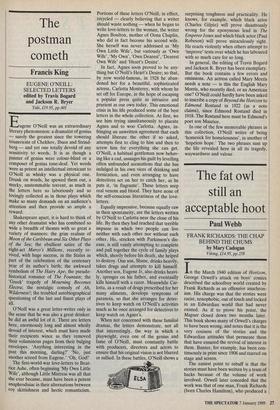The postman cometh
Francis King
EUGENE O'NEILL: SELECTED LETTERS edited by Travis Bogard and Jackson R. Bryer
Yak, f19.95, pp.601
Eugene O'Neill was an extraordinary literary phenomenon: a dramatist of genius — surely the greatest since the towering triumvirate of Chekhov, Ibsen and Strind- berg — and yet one totally devoid of any sensitivity to words. It is as though a painter of genius were colour-blind or a composer of genius tone-deaf. Yet words were as potent an intellectual intoxicant to O'Neill as whisky was a physical one. Drunk on words, he spewed them out, a murky, unstemmable torrent, as much in the letters here so laboriously and so lovingly collected as in those plays which make so many demands on an audience's attention and then provide so ample a reward.
Shakespeare apart, it is hard to think of any other dramatist who has combined so wide a breadth of themes with so great a variety of manners: the grim realism of Moon of the Caribbean and Six Other Plays of the Sea; the ebullient satire of the eight-act Marco's Millions, recently re- vived, with huge success, in the States as part of the celebration of the centenary Year of its author's birth; the awkward symbolism of The Hairy Ape; the pseudo- historical romance of The Fountain; the `Greek' tragedy of Mourning Becomes Electra; the nostalgic comedy of Ah, Wilderness!; the troubled autobiographical questioning of the last and finest plays of all.
O'Neill was a great letter-writer only in the sense that he was also a great drinker: he did an awful lot of it. There are letters here, enormously long and almost wholly devoid of interest, which must have made their recipients wince as they removed their voluminous pages from their bulging envelopes. 'Anything interesting in the post this morning, darling?"No, just another screed from Eugene."Oh, God!'
The first-world-war love-letters to Beat- rice Ashe, often beginning 'My Own Little Wife', although Little Mistress was all that she ever became, must have been a potent anaphrodisiac in their alternations between coy skittishness and hectic romanticism. Portions of these letters O'Neill, in effect, recycled — clearly believing that a writer should waste nothing — when he began to write love-letters to the woman, the writer Agnes Boulton, mother of Oona Chaplin, who did in fact become his second wife. She herself was never addressed as 'My Own Little Wife', but variously as 'Own Wife', 'My Own', 'Own Dearest', 'Dearest Own Wife' and 'Heart's Desire'.
In fact, Agnes soon proved to be any- thing but O'Neill's Heart's Desire; so that, by now world-famous, in 1928 he aban- doned her for a beautiful, sophisticated actress, Carlotta Monterey, with whom he set off for Europe, in the hope of escaping a popular press quite as intrusive and prurient as our own today. This emotional crisis in his life produced some of the best letters in the whole collection. At first, we see him trying simultaneously to placate Agnes and to woo Carlotta. Agnes, in- fringing an unwritten agreement that each should liberate the other if so asked, attempts first to cling to him and then to screw him for everything she can get. O'Neill, a habitual gentleman now behav- ing like a cad, assuages his guilt by levelling often unfounded accusations that she has indulged in his own vices of drinking and fornication, and even arranging to have detectives set on her to catch her, as he puts it, 'in flagrante'. These letters seep real venom and blood. They have none of the self-conscious literariness of the love- letters.
Equally impressive, because equally raw in their spontaneity, are the letters written by O'Neill to Carlotta near the close of his life. By then they had reached that terrible impasse in which two people can live neither with each other nor without each other. He, stricken with Parkinson's dis- ease, is still vainly attempting to complete and pull together the cycle of family plays which, shortly before his death, she helped to destroy. One son, Shane, drinks heavily, takes drugs and attempts to kill himself. Another son, Eugene Jr, also drinks heavi- ly, sponges on his father, and eventually kills himself with a razor. Meanwhile Car- lotta, as a result of drugs prescribed for her many ailments, develops symptoms of paranoia, so that she arranges for detec- tives to keep watch on O'Neill's activities much as he once arranged for detectives to keep watch on Agnes's.
When not concerned with these familial dramas, the letters demonstrate, not all that interestingly, the way in which a playwright, even one of the genius and fame of O'Neill, must constantly battle with producers, directors and actors to ensure that his original vision is not blurred or sullied. In these battles, O'Neill shows a surprising toughness and practicality. He knows, for example, which black actor (Charles Gilpin) will prove disastrously wrong for the eponymous lead in The Emperor Jones and which black actor (Paul Robeson) will prove miraculously right. He reacts violently when others attempt to `improve' texts over which he has laboured with so much care for so long.
In general, the editing of Travis Bogard and Jackson R. Bryer has been exemplary. But the book contains a few errors and omissions. An actress called Mary Morris needs a note — is this the English Mary Morris, who recently died, or an American one? O'Neill could hardly have been asked to inscribe a copy of Beyond the Horizon to Edmond Rostand in 1922 (as a note claims), since Edmond Rostand died in 1918. The Rostand here must be Edmond's poet son Maurice.
In one of the few memorable phrases in this collection, O'Neill writes of being `homesick for homelessness', in another of `hopeless hope.' The two phrases sum up the life revealed here in all its tragedy, waywardness and valour.










































 Previous page
Previous page